Winning deals takes more than guesswork and good luck. You need to provide leads with the right information at the right time, and that’s where pre-sales support comes in. By proactively addressing customer questions, you pave the way to stronger connections, increasing your closing rates.
Research from Harvard Business Review shows that companies using pre-sales strategies achieve win rates of nearly 50% in new acquisitions and up to 90% in renewal deals—far better than average.
Let’s explore the key benefits of pre-sales support and how it can improve your sales strategy and win more customers.
Start boosting your conversions with Lyro AI chatbot
What is pre-sales support?
Pre-sales support is the process of preparing your leads for a confident purchase. This includes everything from market research and lead qualification to discovery calls and tailored proposals – all designed to address concerns and build trust.
For online stores, pre-sales support often involves answering common questions about shipping or returns. Providing clear and helpful answers can make a big difference in a lead’s buying decision.
Beyond handling questions, pre-sales support also helps you identify sales-qualified leads or SQLs—those who are ready to meet with a sales consultant. This frees your sales team to focus on converting SQLs into happy customers, ultimately improving their performance.
Why pre-sales support is critical for your business
Pre-sales support can transform the early stages of the customer journey. Instead of pushing website visitors towards customer self-service options, you can connect with them to address their concerns and build trust. Engaging authentically and removing purchase barriers helps increase your conversion rate while strengthening your brand reputation.
Here are some of the reasons why pre-sales support is important for your business:
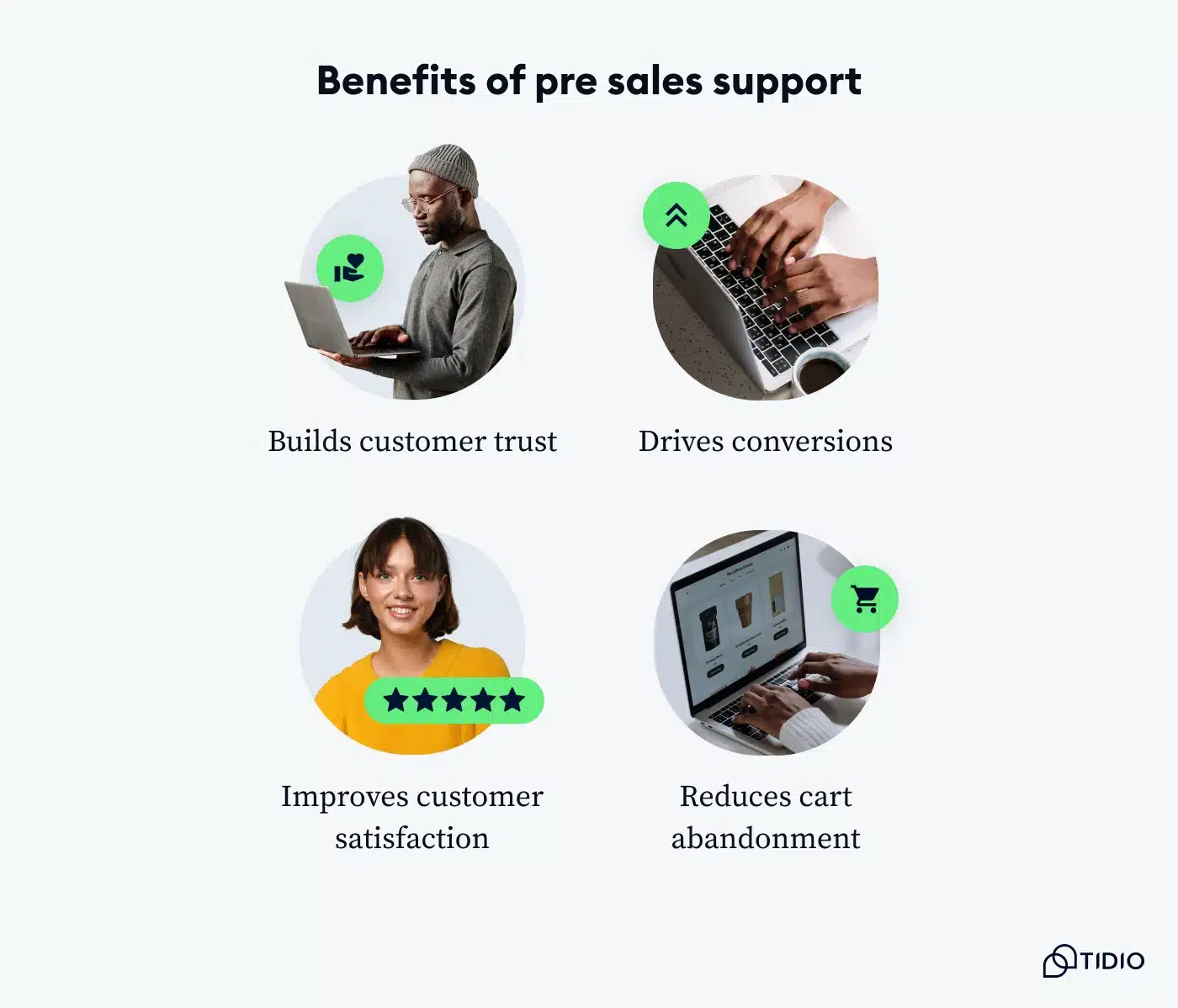
- Builds customer trust: Simplifying the order checkout process doesn’t just grow your revenue—it also strengthens your relationships with customers. By offering timely, conversational customer service, you help them choose confidently and keep them coming back.
- Drives conversions: Focusing on pre-sales conversations is a proven way to boost your conversion rates. Engaging with potential customers early helps address their concerns and guides them toward making informed purchasing decisions, leading to higher sales success.
- Improves customer satisfaction: Pre-sales support provides customers with information about your product, which helps them buy only items that they need. This simplifies the buying process and builds trust. In fact, as many as 94% of American customers will recommend a company if they see their service as “very good.”
- Reduces cart abandonment: Research by Forbes shows the main reasons for shopping cart abandonment among customers are unexpected costs for shipping and sales tax. Pre-sales support can address this by proactively providing clear information about these costs upfront, helping customers make informed decisions, and reducing the likelihood of abandoned purchases.
Read more: Check out the best cart abandonment software to help your business engage, convert, and retain customers.
Common examples of pre-sales support
Pre-sales activities are quickly becoming an indispensable part of the customer journey. They help support teams engage potential customers, identify challenges, and turn questions into sales opportunities.
Here are examples of pre-sales support activities that can help grow your business.
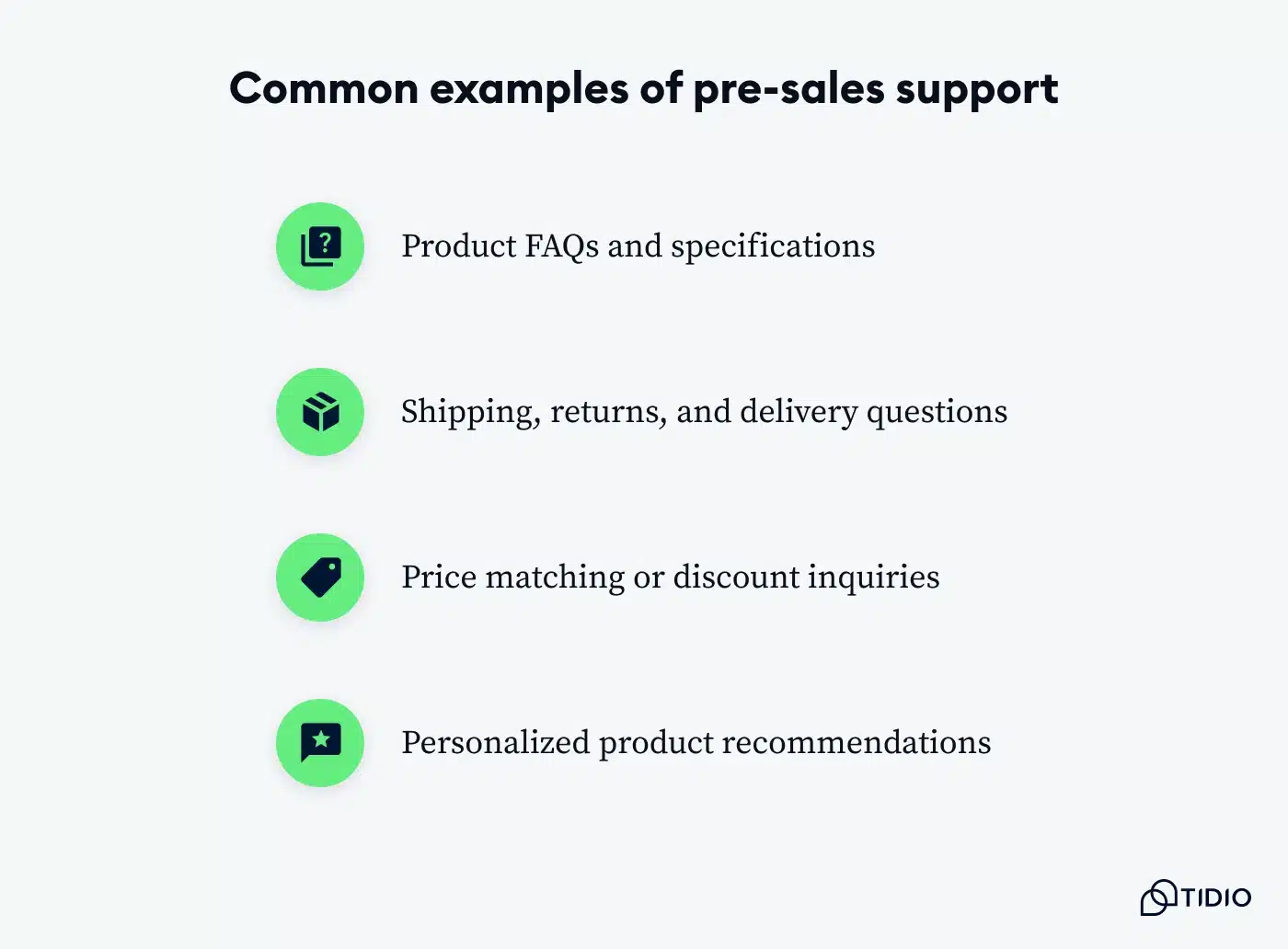
Product FAQs and specifications
Your pre-sales support should answer frequently asked questions about your products. This can include details like color, size, safety precautions, durability, usability, warranty, and more.
Your support agents can actively engage customers to explain product features and how each one can benefit them. They can go the extra mile and recommend alternative products that align with the consumer’s budget or needs.
Shipping, returns, and delivery questions
Shipping and returns are often at the top of customers’ minds, so it’s essential to address these questions clearly and honestly.
Pre-sales conversations should let leads know about estimated delivery times, expedited shipping options, and how returns work if they’re dissatisfied with their purchase. Providing this information not only builds trust but also reassures customers that they’re making the right decision.
Price matching or discount inquiries
Customers often seek clarity on pricing and available promotions. This is where a pre-sales support agent can step in and offer a coupon or special deal to encourage an immediate purchase. If discounts aren’t available, the agent can highlight the product’s unique selling points (USPs) to demonstrate its value and justify the price.
Modern customers are well-informed—they often research online before buying products. To stay ahead, your marketing team should ensure that information about discounts, promotions, and pricing is easily accessible. Being transparent builds trust and gives customers the confidence they need to make a purchase.
Personalized product recommendations
Chatbots can be a powerful tool for providing personalized product recommendations to prospective buyers on ecommerce platforms. Using AI, chatbots can analyze customer behavior, preferences, and browsing history to suggest products tailored to their needs. These recommendations can guide customers toward repeat purchases or upselling opportunities.
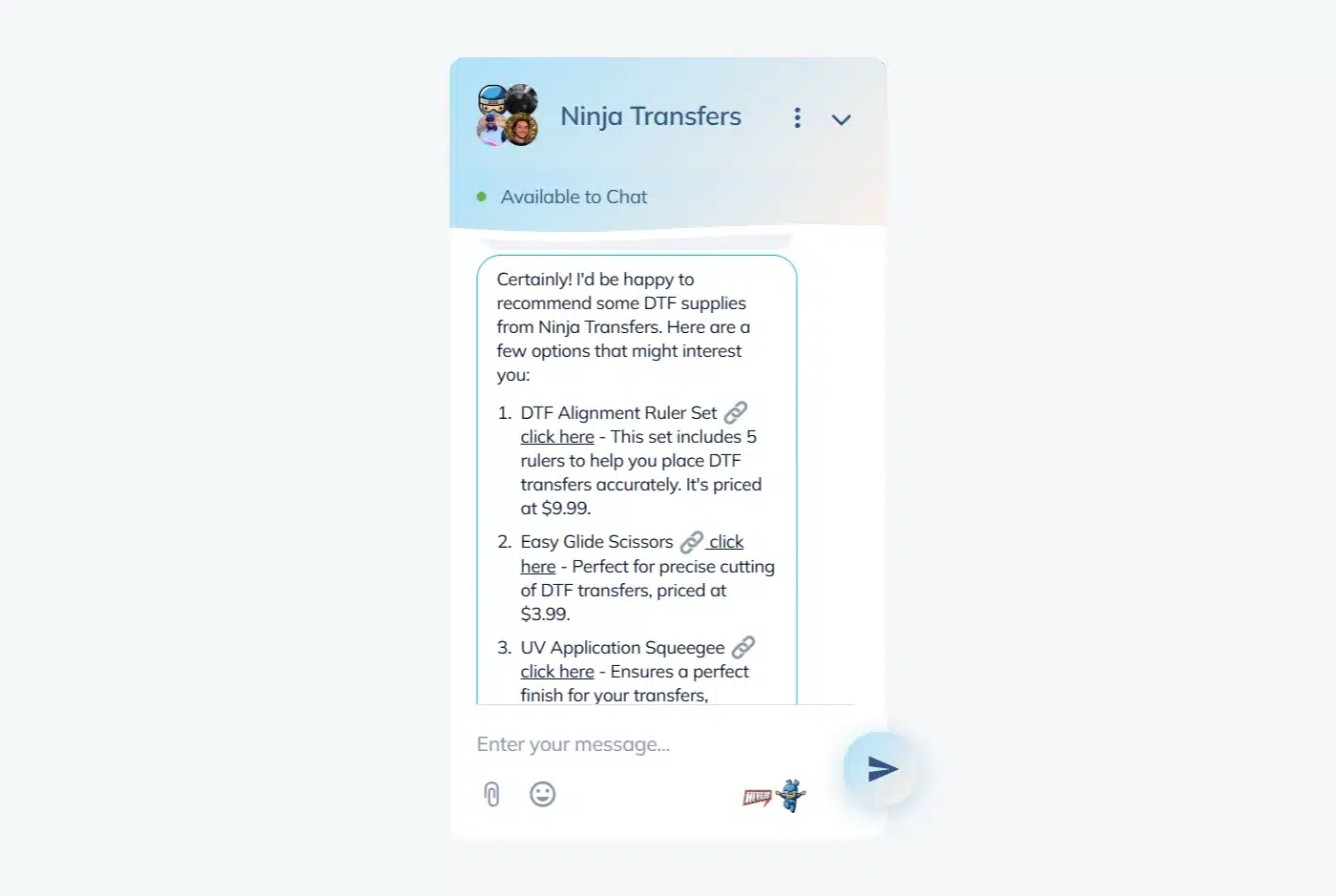
You can also use chatbots to automatically trigger these suggestions when specific conditions are met, such as a customer spending a certain amount of time on a product page or adding items to their cart. Additionally, your agents can use positive scripting to incorporate empathetic and solution-oriented responses, making customers feel understood and supported.
Read more: Discover the ten best returns management software in the market.
7 strategies for improving pre-sales support
Pre-sales support keeps shoppers on your website by addressing any questions they may have. It helps them understand your products better and make faster buying decisions.
Here are seven ways to improve pre-sales support on your website.
1. Optimize your website for pre-sales needs
Unfortunately, your website can be a sales blocker. This usually happens if buyers struggle to find critical information or if your browsing experience is poor.
Compare your website to others to uncover ideas you can adopt to improve its functionality. Analyze user activity to spot underperforming areas, like hidden shipping or return policy pages, and find ways to boost their visibility.
Optimize your site with detailed product descriptions, multiple high-quality images, and upfront delivery timelines to improve user experience and increase sales conversions.
2. Use AI-powered chatbots for instant pre-sales support
Adding AI chatbots to your website is a game-changer for both pre- and post-sales support. These chatbots deliver seamless, human-like interactions through text-based messaging while offering features like multilingual support and third-party integrations.
For example, chatbots like Tidio’s conversational AI, Lyro, are tailored for pre-sales support. Using AI and natural language processing (NLP), Lyro engages website visitors, asks follow-up questions, and provides accurate responses based on customer needs.
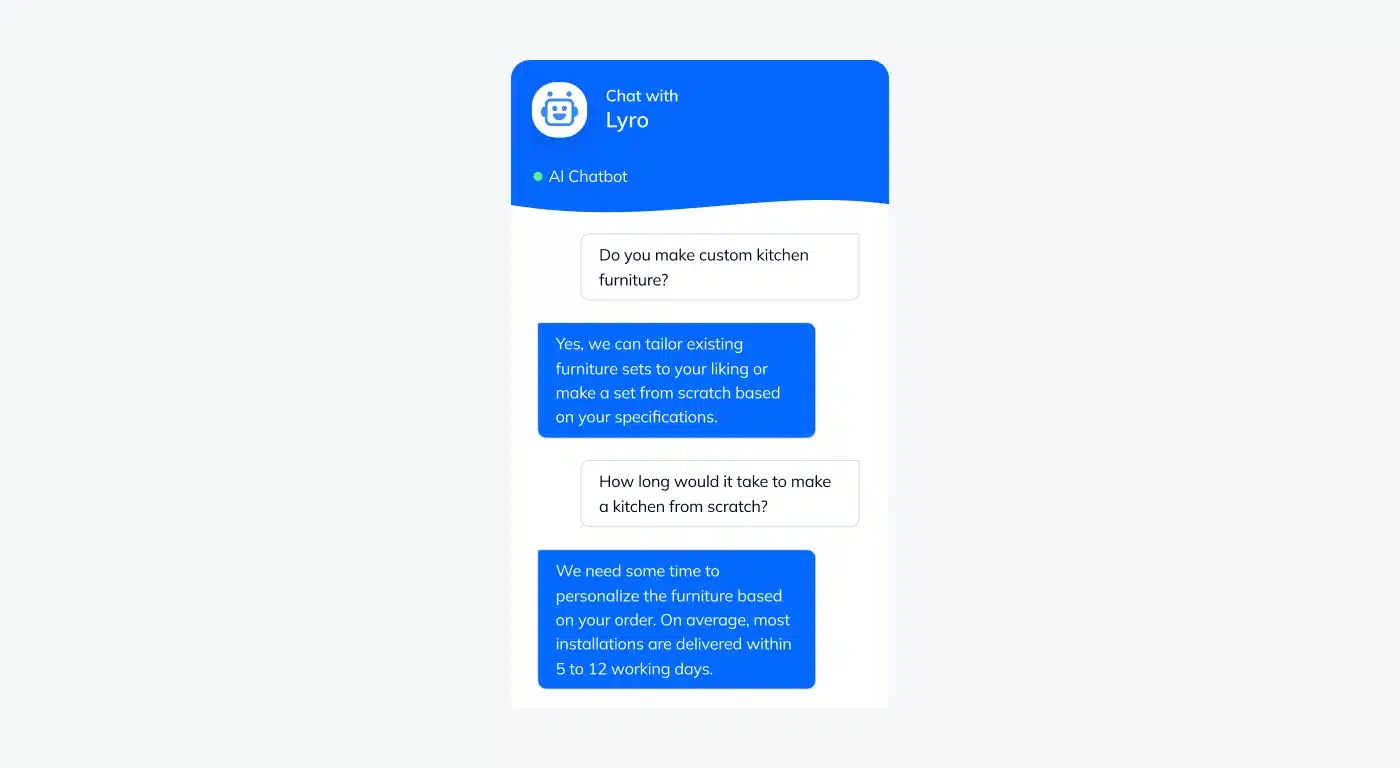
Lyro’s strengths lie in its ability to deliver personalized responses by pulling data from multiple sources, including web pages, FAQs, or past customer interactions. You can customize its answers by manually adding questions and answers, and adjusting its tone to match your brand.
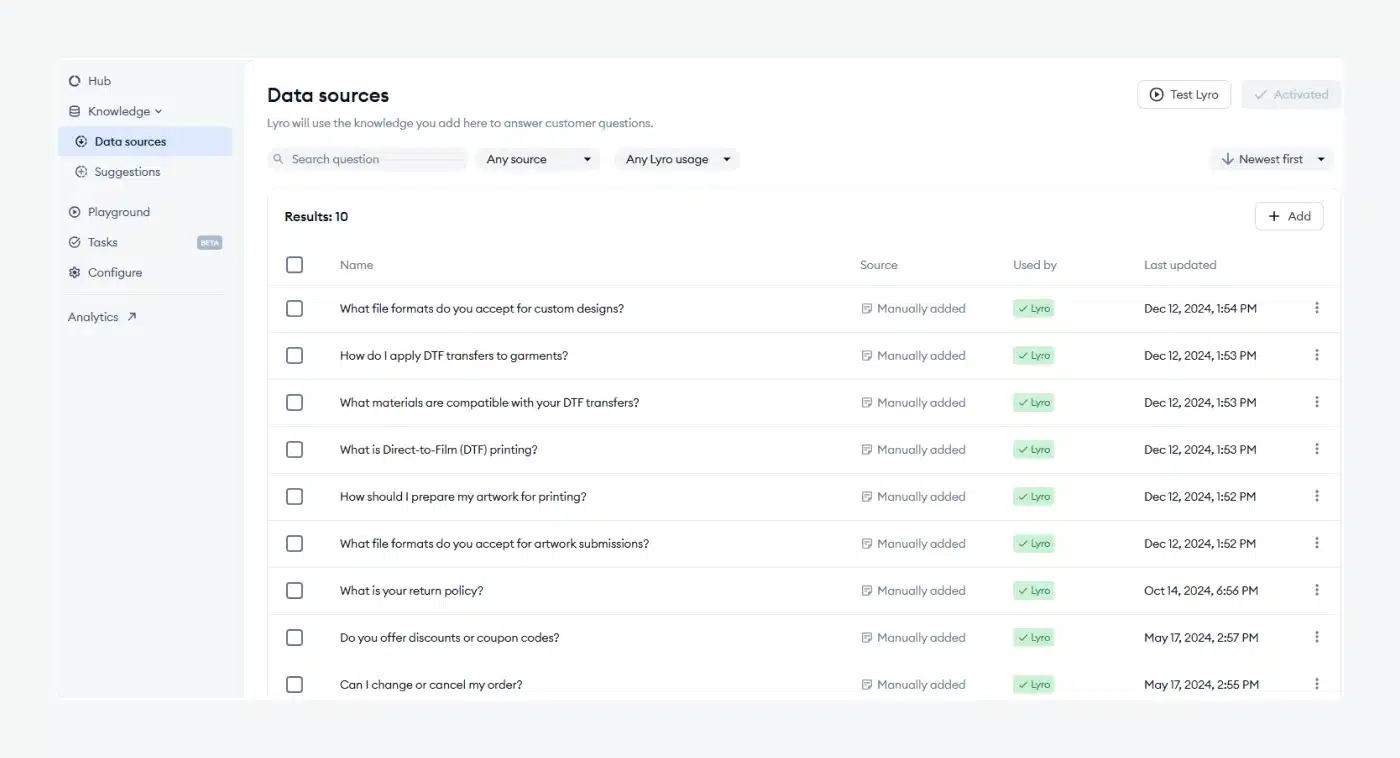
One standout feature is Lyro’s product recommendations. Based on customer inquiries, the chatbot suggests suitable products, recommends complementary items, and guides users through their purchase options.
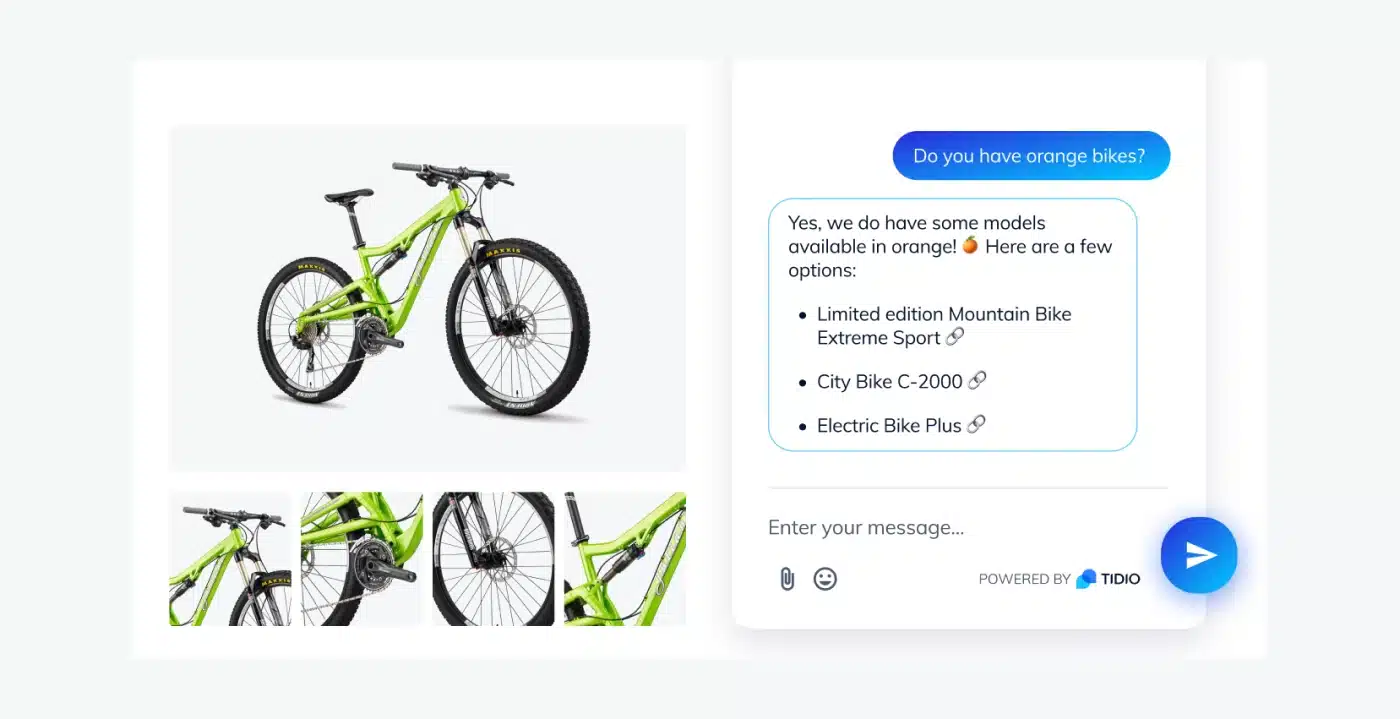
Read more: Explore key tips for building a solid knowledge base chatbot.
Deliver seamless pre-sales support with Lyro AI chatbot
3. Proactively engage visitors with live chat
Live chat tools help website visitors interact with service agents when they can’t access information on your website. You can incorporate FAQs into your live chat software and share them as automated responses to consumers.
Tidio’s chat widget routes customer queries to the right agents and helps them provide immediate answers to website visitors. You can easily integrate the widget into platforms like WordPress and Shopify to share information about promotions, discounts, or delivery timelines.
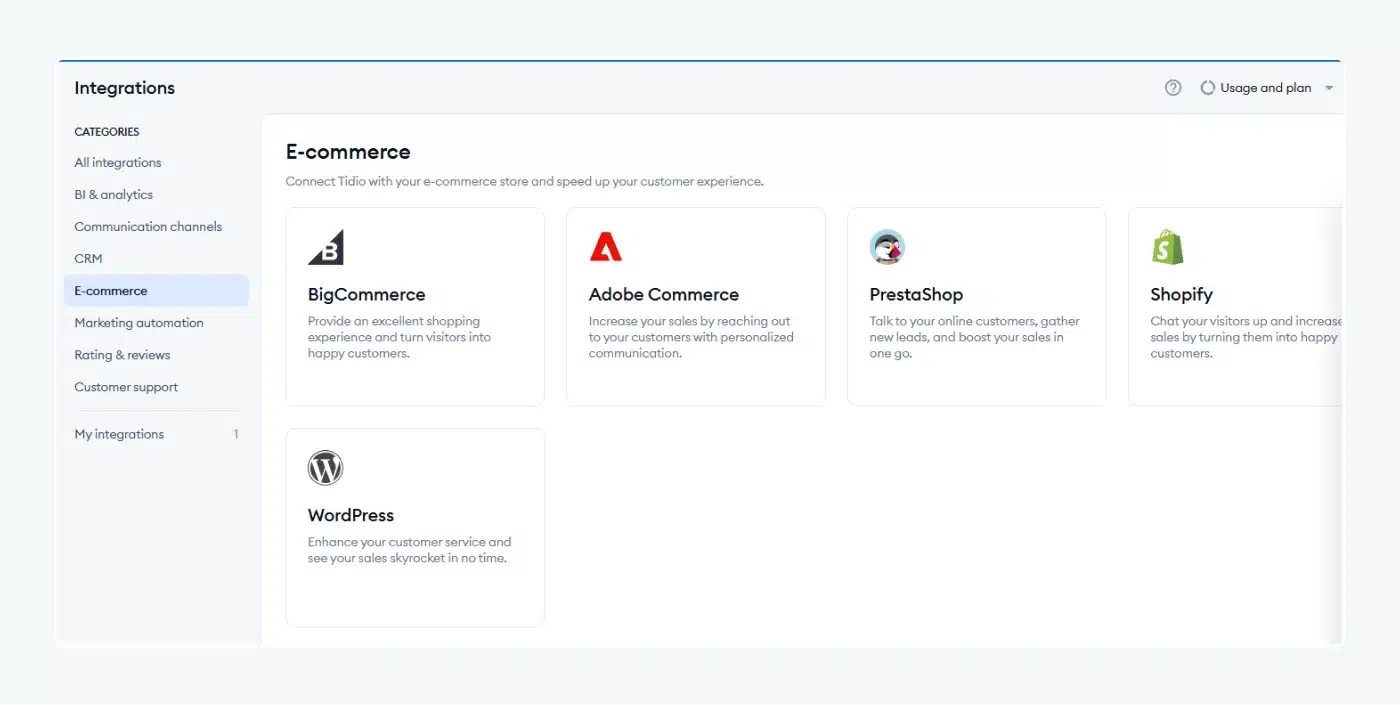
Tidio also offers interactive rule-based chatbots called Flows. They enable you to set up automated, proactive chat messages that reach customers at critical points in their journey and help them convert. You can use Flows to capture quality leads, book appointments, and offer discounts.
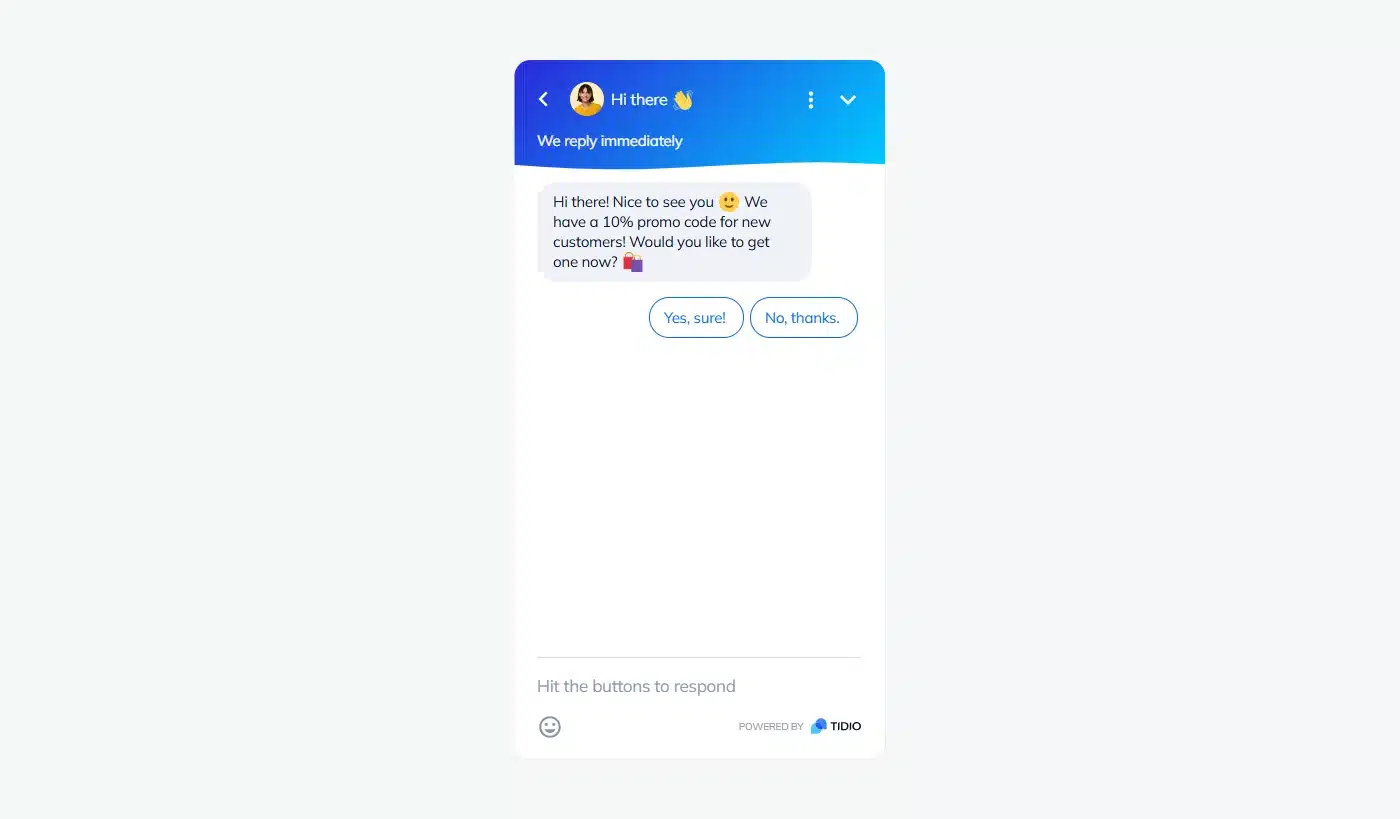
Read more: Find out the best techniques to use live chat for sales in your business.
4. Leverage FAQ pages and help centers
While your landing pages showcase key information, web self-service tools like FAQ pages or Help Centers can centralize answers. Instead of redirecting pre-sales queries straight to email, guide shoppers to resources on your site to keep them engaged.
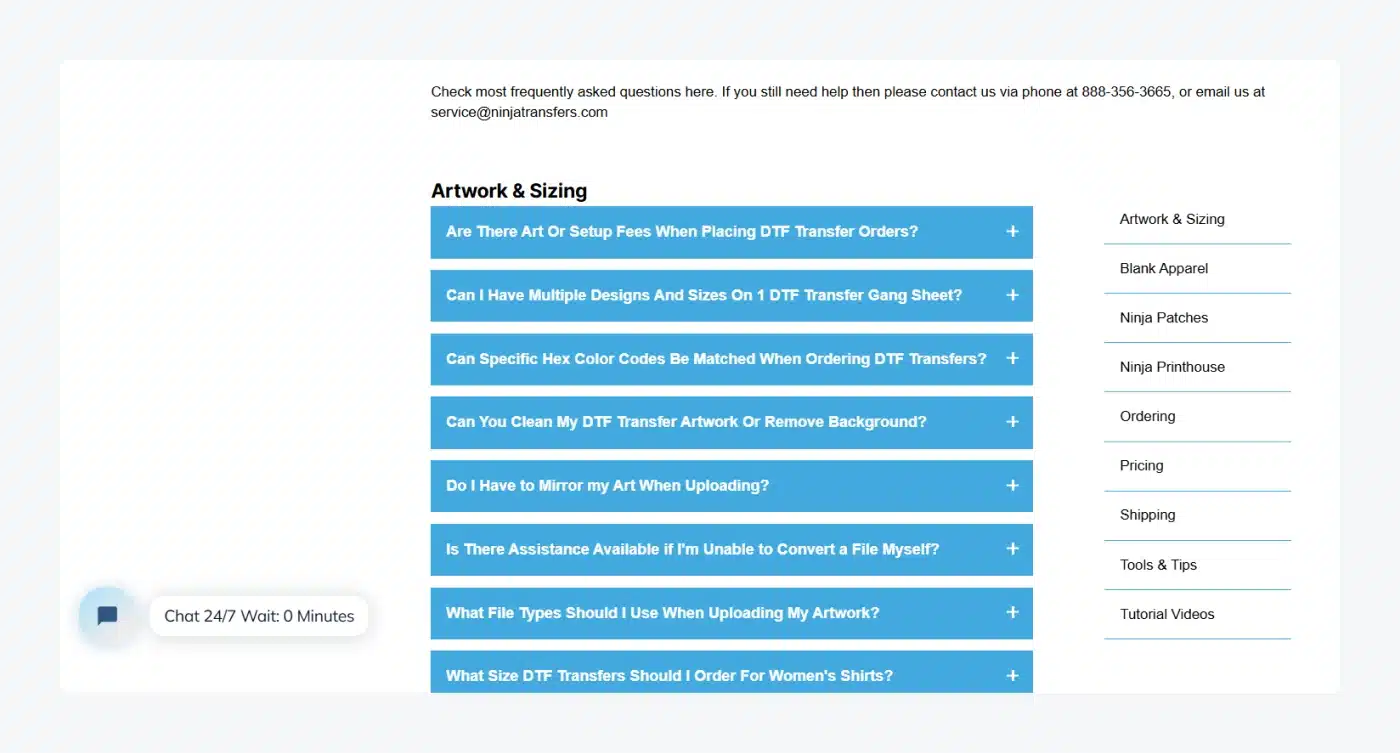
Create a comprehensive resource library to prevent customers from leaving your website—this will help minimize cart abandonment. Make your FAQ pages and Help Centers easy to find by adding them to your navigation or footer menu. Organize their content by categories, titles, or topics, and include a search bar for effortless navigation.
5. Automate pre-sales responses across channels
You can use customer service automation to share your pre-sales answers across multiple channels. For instance, you can use an automated ticketing system that provides omnichannel customer service, enabling you to handle queries on live chat, email, social media, and other channels.
Customer service automation allows you to provide seamless pre-sales support across multiple channels. With an omnichannel help desk tool, you can handle queries from live chat, email, social media, SMS, and more—all in one place.
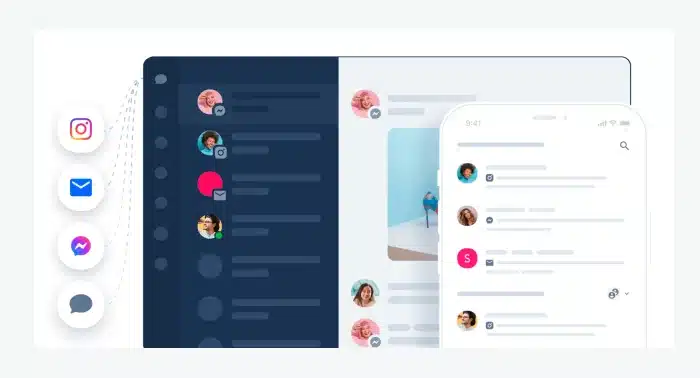
Tidio’s help desk and ticketing system centralizes communication, giving service managers a real-time overview of customer interactions across channels. It also streamlines workflows with features like automated ticket routing that directs inquiries to the right agent. This ensures a smooth and efficient pre-sales experience for your customers.
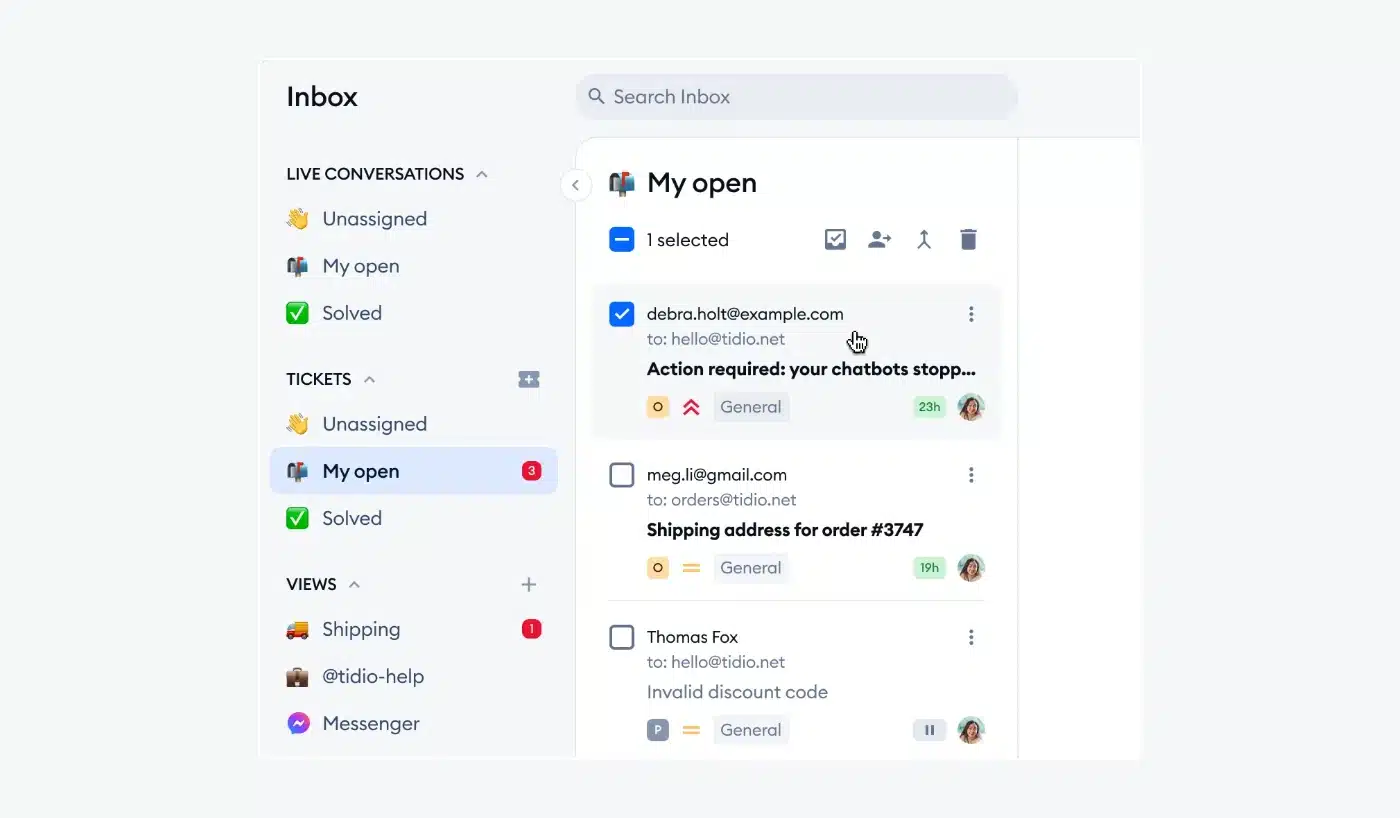
Read more: Compare the best omnichannel support software and choose the one that is suitable for your website.
6. Use custom views for pre-sales tickets
Custom views in your help desk keep sales reps organized by categorizing and prioritizing pre-sales conversations. With Tidio’s custom ticket views, you can create filters to sort tickets by factors like status, priority, or specific tags. This makes it easy to locate and manage pre-sales tickets without missing a beat.

You can also assign filters to specific team members or departments, streamlining workflows. For example, you can set up a dedicated view for pre-sales inquiries so your pre-sales support team can focus on converting prospects without getting sidetracked by unrelated tickets. This customization improves efficiency and customer experience.
Read more: Learn about the most essential ticketing system features and how they can improve your customer service.
7. Analyze pre-sales conversations for insights
Pre-sales communication offers valuable insights into customer preferences and concerns. Chatbots can play a key role here by collecting customer data on common pre-sales questions and client behavior.
For instance, if you are losing many prospects at checkout, it’s worth investigating the cause. Tidio’s Lyro chatbot includes a Suggestions feature which identifies unanswered questions during chat conversations. The chatbot compiles the unanswered questions into a list, making it easy for your team to provide responses for each query and add them to Lyro’s database.
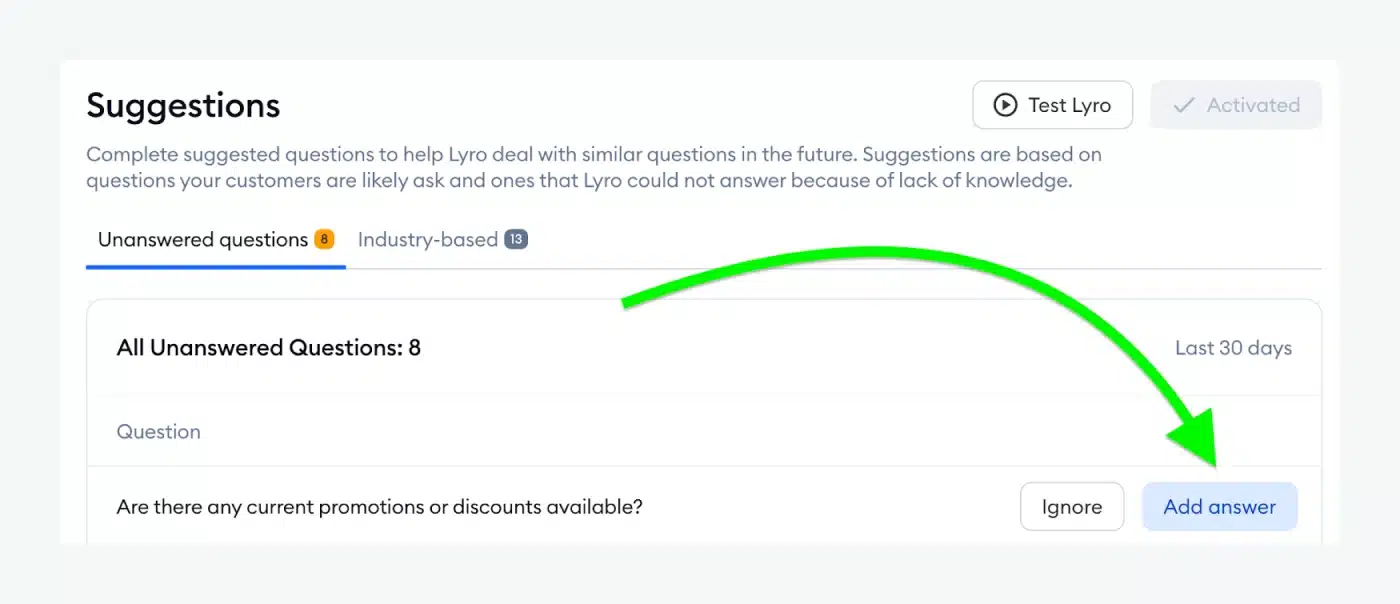
This process improves the chatbot’s performance and ensures that fewer customer queries go unanswered in the future.
Read more: Discover the best sales chatbots and learn how you can use them to boost your business growth.
Best practices for excellent pre-sales support
Pre-sales support can significantly boost your online sales, but success lies in finding the right balance. By following these best practices, you can enhance your customer experience and drive more conversions:
Personalize interactions
Focus your pre-sales efforts on your target audience. Generic, robotic responses often lack engagement. Instead, customize your automated messages to resonate with each prospect’s unique situation, preferences, and goals. For example, tailor your responses based on the type of product they’re exploring or the challenges they’re facing. Asking thoughtful, relevant questions can help you better understand their needs and build meaningful connections.
Be proactive
Don’t wait for customers to bring up their doubts—address potential concerns before they arise. For instance, if visitors are unsure about a product’s effectiveness, offer clear, detailed information about its features and benefits on your website. This proactive approach builds trust and eliminates purchase barriers.
Offer multi-channel support
Convenience is key in pre-sales support, so provide real-time assistance across multiple channels like live chat, SMS, social media, and email. By leveraging multichannel customer service, you create a user-friendly support system that aligns with your customers’ expectations.
Delayed responses—especially to pre-sales emails—can lead to lost opportunities. Being available on multiple platforms helps you engage prospects whenever and wherever they need support.
Train your team
Your pre-sales team should be product experts. With in-depth product knowledge, they can recommend solutions that align with customer interests and goals. From explaining a product’s unique features to highlighting its benefits, a confident and knowledgeable team can effectively guide prospects toward making a purchase.
Read more: Compare the reviews about the best customer experience software for your business.
Pre-sales vs. post-sales support
The main difference between pre-sales and post-sales support is the role they play in the customer journey.
Pre-sales support focuses on engaging potential customers before they make a purchase. This involves answering questions, educating prospects about product features and benefits, and guiding them toward a decision through demos, recommendations, and other resources. The goal is to turn prospects into satisfied clients and increase revenue.
Post-sales support, on the other hand, begins after the purchase. It’s about addressing customer pain points, resolving issues, and ensuring they get the most out of their product. This stage is essential for building customer loyalty and encouraging repeat business.
In short, the focus in pre-sales is on driving sales, while post-sales centers on customer retention and loyalty. Metrics differ as well:
- Pre-sales success is measured by lead generation, conversion rates, and deal closures
- Post-sales performance tracks customer satisfaction, retention, upsell opportunities, and support resolution rates
By balancing both pre-sales and post-sales support effectively, you can create a seamless customer journey that drives growth and long-term satisfaction.
Streamline your pre-sales support with Tidio
In today’s competitive market, delivering excellent customer service at every stage of the customer journey is crucial. The pre-sales process begins when a prospect starts exploring your product and lasts until they complete their purchase. Providing a seamless and engaging pre-sales experience is key to capturing attention and driving conversions.
Tidio streamlines this process by empowering your pre-sales team to generate qualified leads and improve conversion rates. With Lyro, Tidio’s AI-powered chatbot, you can automate responses to inquiries, engage prospects in real time, and gather valuable insights into customer preferences. Additionally, Lyro enables you to handle pre-sales and post-sales support across multiple communication channels.
Give Lyro a try and turn customer interactions into valuable relationships!

